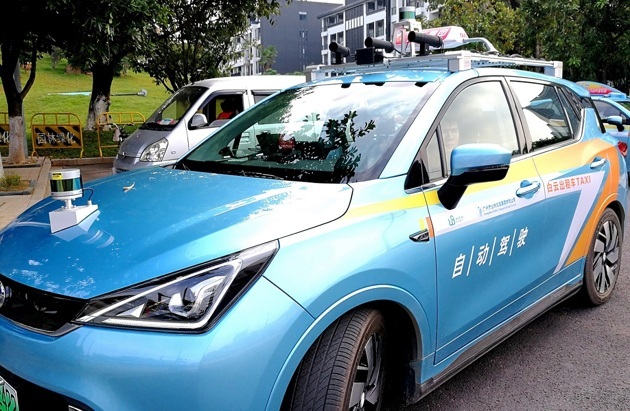
Photo/Wang Fan
Nov. 19 (NBD) -- China's first self-driving taxi hit the road early this month, providing rides to passengers from a main entrance of Guangzhou University to a nearby subway station, which has caused a sensation among the public.
However, the trial was called off by regulators the second day due to safety concerns over complicated road conditions near the university.
Pilot run continues despite minor hindrance
The pilot run was later transferred to Guangzhou International Biotech Island where the self-driving taxi's technology provider WeRide.ai has carried out road tests for 10 months.
NBD found on the scene that the self-driving taxi was a L4 level auto-driving vehicle equipped with 2 radars, 3 professional cameras and 1 millimeter-wave radar, offering all-round sensations.
The fleet of taxis had offered over 100 rides as of November 14.
Zhang Li, COO of WeRide.ai, said to NBD that when self-driving technology develops to a certain extent, it has to be tested through commercial application, and taxis provide one of the application scenarios with the most promising prospects.
Market players competing to commercialize their cars
Miao Wei, head of China's Ministry of Industry and Information Technology, said at the World Intelligent Connected Vehicles Conference last Month that the intelligent car market is expected to exceed 100 billion yuan (14.4 billion U.S. dollars) by 2020.
Traditional car makers represented by Baic Motor and Saic Motor, Internet giants like Baidu, and start-ups such as TuSimple, WeRide.ai and Pony.ai are all eyeing the self-driving business and competing to cash in on the technology.
This May, Baidu launched test run of autonomous cars powered by its upgraded Apollo intelligence platform in Chongqing, trying to offer solutions to the last-mile conundrum. The cars are capable of valet parking, auto-recharging and remote control.
On October 16, technology start-up TuSimple obtained China's first road test license for autonomous heavy trucks.
Early this month, Roadstar.ai's self-driving cars offered shuttle service for participants of the 5th World Internet Conference.
Business model yet to be tested
Cheng Shidong, a division director at the Institute of Comprehensive Transportation of the National Development and Reform Commission, told NBD that although there are many application scenarios for self-driving technology, yet the large-scale application is most likely to happen in the taxi industry.
As a taxi driver' salary generally takes up nearly 50 percent of the total costs of running a taxi, self-driving technology can reduce dependence of the industry on drivers, Zhang explained to NBD. However, taxies demand more advanced self-driving technology due to more complicated road conditions compared with trucks and shuttle buses, Zhang added.
NBD noticed that the U.S. has lead the way in the commercialization of self-driving technology. Taking Alphabet's Waymo as an example, it has started charging for some of its self-driving trips and exploring its pricing mechanism.
However, there is still some way to go before actual commercialization of self-driving technology in China, Cheng noted. He advised domestic companies to slowly expand the scope of testing and exploration of self-driving technology on the premise of safety.
Email: tanyuhan@nbd.com.cn


 川公网安备 51019002001991号
川公网安备 51019002001991号





